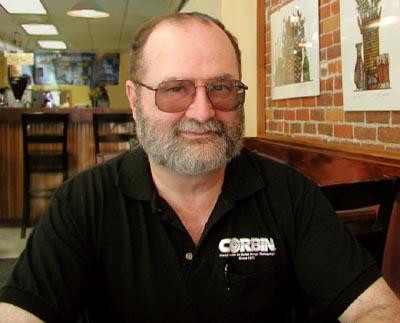Working for you is FUN! |
Dave Corbin, founder and president of Corbin Manufacturing and Supply, Inc., has had a long career helping others start successful businesses, and has founded or served as a director in a number of other firms, from software development to marine electronics, rental housing to publishing. |
His resume includes a brief period as a bank director, several years as a Navy electronics specialist involved in communication, navigation and countermeasures (with special award related to development of an ECM device during late 1960's), National Merit Scholarship 1963, founder of Teletron Communication Electronics, Inc., FCC 1st Class Commercial radiotelephone licensee (now called "General Class") with Shipboard Radar endorsement, former FAA avionics technician, owner with his wife Katherine of Corbin Software, Corbin Computers, Tombstone Gun Grips, and Corbin Rental Homes (CR Homes), and writer of a number of books and several hundred magazine articles (published in electronics journals, firearms magazines, trucking industry journals, and commercial fishing magazines). |
 Some of Dave's favorite guns Dave relaxes at the piano, develops business and engineering software, and writes technical articles and books, as well as websites for his own businesses and for clients. He and his wife Katherine work together in the businesses, and enjoy traveling together on business and vacation trips, often visiting firearms and ammunition factories, museums, and personalities, to research for books and articles. Their three children are grown: Mary Beth has a career as a human resources manager (including several years at the Federal Reserve in two branches), Cynthia is a registered nurse, and Christopher has worked in metal machining, electronics QC inspection, and is currently living in Medford, Oregon. Mary Beth's children Alex and Andie plus Cynthia's daughter Jennifer make Katherine and Dave triple grandparents. |
 Dave often tells clients that he believes one of the big secrets to a happy life is to find a way to make a living that is so enjoyable you look forward to each day as if the work was a hobby. "You can't really be a work-a-holic if it isn't work to you," he says. "After all, which is more fun, staring four and a half hours every evening into a TV set while the meter runs on your life, or spending that time helping other people get something they want and, in the process, learning and earning a little more, yourself?" Dave often tells clients that he believes one of the big secrets to a happy life is to find a way to make a living that is so enjoyable you look forward to each day as if the work was a hobby. "You can't really be a work-a-holic if it isn't work to you," he says. "After all, which is more fun, staring four and a half hours every evening into a TV set while the meter runs on your life, or spending that time helping other people get something they want and, in the process, learning and earning a little more, yourself?""As long as this time is vocation that could be considered a hobby, and doesn't intrude on your family life in a negative way, work should not interfere with other aspects of a fulfilling life. The first priority is family, but there's no problem with a second being the way you provide for them. That's also a stalking horse for the need to know why you exist, and what good you are doing in the world. If you like your work, and your basic values are reasonable, then the odds are high that your work will be good for everyone it touches. It may even serve as a good example for your competitors!" He believes that the "Golden Rule" is probably one of the best guides to life, and offers the following advice to friends and clients alike: |
Start writing here...

 Dave says... If you do your best, think of the other person's needs, and deal with honesty, then the vast majority of people with whom you deal will get as much from every encounter as you do, in a fair and equitable trade of values. That is the basis for a successful life, company, or economy. It is the way lasting relationships can be achieved: whenever there is unfairness or inequity, the books always remain open, waiting patiently to be balanced while interest silently accrues. These moral accounts eventually will be closed: it is in our own best interest to treat other people well from the beginning.
Dave says... If you do your best, think of the other person's needs, and deal with honesty, then the vast majority of people with whom you deal will get as much from every encounter as you do, in a fair and equitable trade of values. That is the basis for a successful life, company, or economy. It is the way lasting relationships can be achieved: whenever there is unfairness or inequity, the books always remain open, waiting patiently to be balanced while interest silently accrues. These moral accounts eventually will be closed: it is in our own best interest to treat other people well from the beginning.

 If your ambition is fantastic as long as the work is still in the talking and planning stages, but suddenly evaporates when it comes time to begin the hard work, then you will have to adjust the height of your goal to match the distance you are prepared to run. A pole vaulter won't go very high if he can't motivate himself to take more than a few faltering steps before sticking the pole in the ground. On the other hand, the goal might inspire you to greater ambition if you really want to reach it. I've found that most people do not fail so much as give up before reaching their goal.
If your ambition is fantastic as long as the work is still in the talking and planning stages, but suddenly evaporates when it comes time to begin the hard work, then you will have to adjust the height of your goal to match the distance you are prepared to run. A pole vaulter won't go very high if he can't motivate himself to take more than a few faltering steps before sticking the pole in the ground. On the other hand, the goal might inspire you to greater ambition if you really want to reach it. I've found that most people do not fail so much as give up before reaching their goal.
About Dave Corbin